3 Best Fast-Growing Flowering Bulbs : A Complete Guide for a Stunning Garden
Table of Contents
1. Introduction
Fast-growing flowering bulbs are a gardener’s best friend. They add quick bursts of color, require little maintenance, and return year after year. Whether you’re a beginner or an experienced gardener, these bulbs are a simple way to create a stunning garden without waiting months for results.
Why Choose Fast-Growing Bulbs ?
- They bloom quickly, often within 4 to 8 weeks.
- They are easy to plant and care for.
- They can be grown in pots, garden beds, or even indoors.
- Many varieties are perennials, meaning they come back year after year.
If you’re looking for a fast, reliable way to brighten up your outdoor space, fast-growing bulbs are the perfect choice.
2. Understanding the Basics
Fast-growing bulbs differ from slow-blooming varieties in a few key ways. They tend to establish roots quickly, grow rapidly, and bloom within a short period.
How Do Flowering Bulbs Grow So Fast ?
Bulbs store energy and nutrients inside their structure. When planted, they use these reserves to sprout and bloom quickly, making them one of the easiest plants to grow.
Best Conditions for Growing Bulbs
- Soil : Well-draining soil prevents rot.
- Watering : Moderate watering => too much can cause bulbs to decay.
- Sunlight : At least 6 hours of direct sun for most varieties.
Popular Fast-Growing Bulbs
- Spring bloomers : Tulips, daffodils, crocuses, hyacinths.
- Summer bloomers : Gladiolus, lilies, amaryllis, freesia.
- All-season favorites : Anemones, ranunculus, alliums.

3. Choosing the Right Plants
Not all fast-growing bulbs are suited for every climate. Choosing the right ones for your region ensures success.
Climate Considerations
- Cold climates : Tulips, crocuses, daffodils thrive.
- Warm climates : Gladiolus, amaryllis, freesia prefer heat.
- Moderate climates : Lilies, hyacinths, and alliums work well.
Best Bulbs for Low Maintenance Gardening
- Daffodils : Hardy and require little care.
- Crocuses : Naturalize well and spread over time.
- Amaryllis : Can be grown indoors or outside.

4. Planting Guide & Setup
A good start ensures strong, healthy blooms. Follow these steps for perfect planting.
Step-by-Step Guide
- Prepare the Soil : Mix compost into well-draining soil.
- Plant at the Right Depth : A general rule—bury bulbs twice as deep as their height.
- Spacing : Allow room for bulbs to multiply over time.
- Water : Give a deep watering right after planting.
Best Times to Plant Bulbs
- Spring bloomers : Plant in fall.
- Summer bloomers : Plant in early spring.
- Year-round blooms : Use a mix of both types.

5. Essential Care & Maintenance
Once planted, bulbs need minimal care to thrive.
Key Maintenance Tips
- Watering : Keep soil moist but not soggy.
- Fertilization : Use a phosphorus-rich fertilizer before blooming.
- Mulching : Helps retain moisture and prevents weeds.
Encouraging Bigger and Better Blooms
- Deadhead spent flowers to direct energy to the bulb.
- Divide overcrowded bulbs every 2-3 years.
- Protect bulbs from extreme weather with mulch or covers.

6. Common Problems & Solutions
| Problem | Cause | Solution |
|---|---|---|
| Bulbs not sprouting | Too deep, rotten bulbs | Check depth and drainage |
| Weak, leggy growth | Lack of sunlight | Move to a sunnier spot |
| Pests | Aphids, mites, thrips | Use neem oil or insecticidal soap |
| Bulb rot | Overwatering, poor drainage | Improve drainage, reduce watering |
7. Harvesting & Maximizing Your Garden’s Potential
Some bulbs can be cut for indoor arrangements.
How to Cut Flowers Without Damaging Bulbs
- Use sharp scissors and cut stems at an angle.
- Leave foliage behind so the bulb can store energy for next year.
Tips for Continuous Blooming
- Deadhead flowers after blooming.
- Feed bulbs a light fertilizer post-bloom.
- Replant bulbs in new locations every few years.

8. Final Thoughts & Call to Action
Fast-growing bulbs are a great way to enjoy a beautiful garden with minimal effort. By selecting the right varieties, planting them correctly, and maintaining them properly, you can ensure vibrant blooms season after season.

9. Conclusion
Flowering bulbs are an easy and rewarding way to bring beauty to any space. Their quick growth and stunning blooms make them a must-have for any gardener.
10. FAQs: Common Questions About Fast-Growing Flowering Bulbs
1. What is the fastest-growing flower bulb?
Crocuses, daffodils, and hyacinths are among the quickest, blooming within 4-6 weeks.
2. Can I plant bulbs in pots?
Yes! Use well-draining soil and ensure proper sunlight.
3. Do bulbs regrow every year?
Many bulbs, like daffodils and lilies, are perennials and will return yearly.
4. Why are my bulbs not blooming?
Possible reasons: poor soil, too much shade, or overcrowding.
5. Can I plant bulbs in summer?
Yes, summer bloomers like gladiolus and lilies should be planted in spring.
6. What happens if I plant bulbs too deep?
They may struggle to emerge or bloom late.
7. How do I protect bulbs from pests?
Use natural repellents like garlic spray or companion planting with strong-scented herbs.

